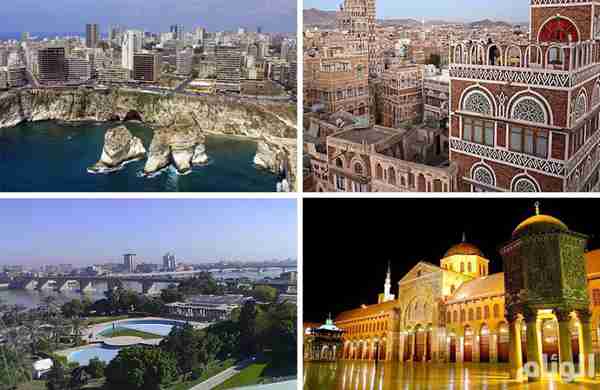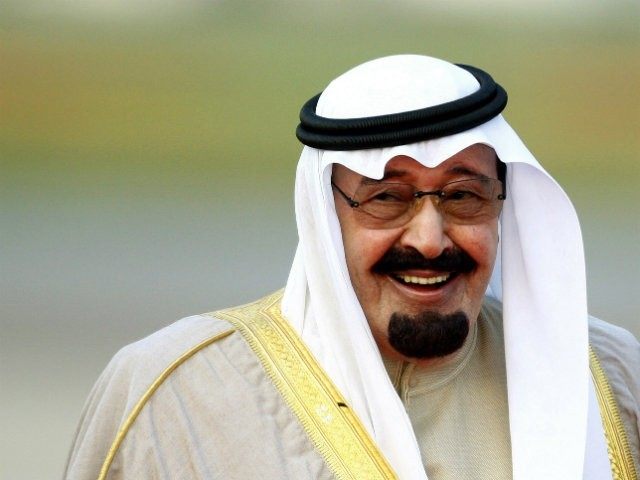This morning’s key headlines from GenerationalDynamics.com
- Death of Saudi’s King Abdullah raises concerns about policy changes
- Saudi Arabia trapped in a corner over Syria policy
- More on the political realignment of the Mideast following the Gaza war
Death of Saudi’s King Abdullah raises concerns about policy changes

The four Arab capitals claimed last year by Iran — Beirut (Top L), Sanaa (Top R), Baghdad (Bottom L), Damascus (Bottom R) (AlWeeam)
The death on Thursday of Saudi Arabia’s 90-year-old King Abdullah bin Abdulaziz al Saud and the subsequent appointment of his younger half-brother, 79-year-old Salman bin Abdulaziz al Saud, is raising a number of questions about whether Saudi policies are going to change under the new leadership. The consensus is that the succession was carefully planned in advance to preserve stability and continuity, but still, some concerns have been raised. Most of the media coverage has been about women’s rights, but there are other issues of greater geopolitical significance.
First, Yemen is along Saudi Arabia’s southern border and as we’ve been reporting, that government has collapsed, and no one knows who is running the country today, let alone who will be running the country next week. The Iran-backed Shia Houthis have taken over most of the government buildings in the capital city Sanaa, and may thus be considered the de facto government, but the Houthis have made it clear that they want to run the government without actually being officially in charge. One of the reasons for this gracious reluctance is that the Saudis have made it clear that they won’t tolerate a Shia government in Yemen. In the meantime, Al-Qaeda in the Arabian Peninsula (AQAP), which is headquartered in Yemen, is taking advantage of the chaos in Sanaa to link up the other Sunni tribes in preparation for a sectarian war, while the tribes in the far south of Yemen are declaring their intention of seceding.
Next, Iran is Saudi Arabia’s bitter enemy, and Iran is gaining influence throughout the Mideast, at Saudi expense. In fact, last year Iran bragged that Sanaa is the fourth Arab capital in Iran’s grasp, joining “the three Arab capitals who are already a subsidiary of the Iranian Islamic revolution,” and part of “the greater jihad.” The other referenced Arab capitals are Beirut, Lebanon; Baghdad, Iraq; and Damascus, Syria. Iran is also supporting Shia activists in eastern Saudi Arabia and in Bahrain. Saudi Arabia has urged both Israel and the U.S. to go through with much-discussed plans to take out Iran’s nuclear facilities with military strikes.
The meteoric rise of Islamic State of Iraq and Syria (IS or ISIS or ISIL) is obviously of concern to the Saudis, as it is of concern to everyone in the Mideast. It is widely believed in the West that some tribal elements in Saudi Arabia are providing funds and support to ISIS, with the intention of eventually overthrowing the al-Saud government, replacing it with an ISIS or Wahhabi government.
An interesting sidebar is that the Saudis have discussed building a 600-mile barrier along its northern border, to provide protection from ISIS in Iraq and Syria, and another fence along its southern border, to provide protection from the Houthis in Yemen. Since the fall of the Berlin Wall 25 years ago, we have seen fences built along the southern border of the U.S., around all the borders of Israel, and along the border between Greece and Turkey. These would be two new fences.
Oil policy could play a big part in the decision-making of the new King. Oil prices have fallen 60% since June of last year, mainly thanks to fracking in the United States, and the Saudis are being pressured by some other oil-producing countries to reduce oil output, to boost oil prices. Immediately after the death of Abdullah, the Saudis reassured the world that there would be no reduction in oil output. Oil prices increased briefly, but soon decreased again. BBC and Reuters and Daily Mail (London)
Saudi Arabia trapped in a corner over Syria policy
Like many Arab Sunnis, the Saudis are appalled that Syria’s president Bashar al-Assad has been conducting a virtual genocide against his own people. Syria’s Shia/Alawite president Bashar al-Assad has flattened entire Sunni villages with Russia’s heavy weapons, killed children by sending missiles into exam rooms and bedrooms, killed dozens with sarin gas, and killed countless more with barrel bombs loaded with explosives, metals, and chlorine gas. In addition, he has used electrocution, eye-gouging, strangulation, starvation, and beating on tens of thousands of prisoners on a massive “industrial strength” scale, and does with complete impunity– in fact with encouragement and support from Russia and Iran.
The Saudis blame the rise of ISIS on al-Assad’s actions (as do I). The Saudis are furious that the U.S. did nothing to stop al-Assad’s genocidal attacks on Sunni Arabs in Syria, and are particularly contemptuous of President Obama’s “red line” flip-flop, allowing al-Assad to use chemical weapons on his own people with impunity.
In a recent interview, Prince Turki bin Faisal Al Saud likened the Islamic State to the Mafia, saying that they are “more criminal than they are religious.” His own anecdotal evidence suggested to him that the group’s members were more concerned with “robbing” and “looting,” with many only joining the organization for the money.
This is potentially an explosive situation, because it is not clear how long the Salafist factions in Saudi Arabia will continue to tolerate al-Assad’s genocidal actions. Whether the West likes it or not, the new Saudi leadership may decide it has no choice but to take its own action against al-Assad. CNBC and Deutsche-Welle
More on the political realignment of the Mideast following the Gaza war
As I’ve written several times last year, there has been a major Mideast realignment following the Gaza war, bringing Israel plus Egypt plus Saudi Arabia plus the Palestinian Authority in alliance versus Hamas plus Qatar plus Turkey plus the Muslim Brotherhood. The split was extremely vitriolic, especially between the Saudis and Qataris, and although the differences were papered over late last year, there’s little doubt that the feelings are as strong as ever. And the mediator who got everyone to agree to paper over the differences was none other than Saudi King Abdullah, who has now passed away.
This is a deep, simmering issue in the Arab world, and the new King of Saudi Arabia is going to be at the center of it. All the Arab states have as a policy the destruction of “the Zionist entity,” at least at the lip service level. But there are plenty of open questions. When something happens that forces both the Saudis and Qataris to choose between the Palestinian Authority and Hamas, will they both choose the same side or different sides? Once again, this is a potentially explosive situation that only time can resolve.
KEYS: Generational Dynamics, Saudi Arabia, Yemen, Iran, Iraq, Abdullah bin Abdulaziz al Saud, Salman bin Abdulaziz al Saud Al-Qaeda in the Arabian Peninsula, AQAP, Islamic State / of Iraq and Syria/Sham/the Levant, IS, ISIS, ISIL, Daesh, Syria, Bashar al-Assad, Houthis, Turki bin Faisal Al Saud, Hamas, Palestinian Authority, Qatar
Permanent web link to this article
Receive daily World View columns by e-mail

COMMENTS
Please let us know if you're having issues with commenting.